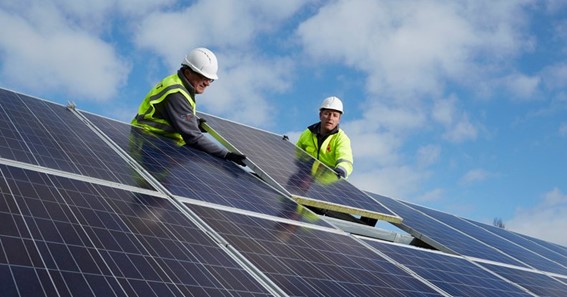The energy industry has long been one of the most damaging to the planet, which has caused many companies to look for alternative sources to power our homes, vehicles, businesses, and electronics.
One of the most popular and widely used alternative energy sources are solar panels. The slow shift towards renewable energy has been an important one and solar panels have allowed us to reduce our dependence on fossil fuels.
But although solar panels are effective at reducing greenhouse gas emissions and providing clean energy, they will eventually come to the end of their useful life.
When it comes to this point, what do you do? If you want to find out whether you can recycle solar panels, keep on reading!
The Life Cycle of Solar Panels
Like any item, it takes a considerable amount of money, materials and resources to manufacture solar panels. The production stage of this process can consume a lot of energy and creates a significant carbon footprint, however this is a footprint that the solar panels aim to displace during their life cycle.
Solar panels that you see on buildings and homes are made of solar cells, also known as photovoltaic cells, which are made out of silicon semiconductors. These panels are able to absorb sunlight and generate electricity from it.
During the use of solar panels, the panels offset the majority of the energy that was used during its production, and are able to generate renewable energy to compensate for it. On average, solar panels will take around six months to two years to offset the energy used to produce the panels.
Solar panels are then expected to have a useful life of around 25–30 years. After this time, it’s important that they are disposed of in an environmental way. Which is why many companies are starting to turn their efforts to improving the end-of-life management of solar panels.
Currently, many of the solar panels in use today were installed in the 90s so it’s becoming a pressing issue that we create a more sustainable method of disposal. Recycling is not very widespread at the moment as the technology hasn’t been around long enough for a large amount of solar panels to have come to the end of their lives.
As more solar panels come to the end of their lives, the issues with the recycling process have been highlighted. Recycling solar panels can be extremely tedious and involves deconstruction, which can consume a lot of energy and resources.
Click here – Stress And Its Impact On Mental Health
Different Types of Solar Panels
There are two main types of solar panels: thin film-based solar panels and silicon-based solar panels. Both of these types of panels are made using very different materials which means that they have to be recycled with care.
Unlike thin film solar panels, which can be shredded, silicon-based panels have to be disassembled before certain parts are reused and recycled.
Here’s some more information about the two different types of panels.
Thin Film Based Solar Panels
Thin film solar panels are made by depositing layers of thin solar material onto a solid surface – like glass, plastic or metal. These films are made through a physical vapour deposition process, like magnetron sputtering. There are also other processes like thermal vapour deposition, beam evaporation or plasma deposition that can also be used to develop the materials.
Thin film solar panels must be shredded, and broken up into particles that are no larger than 4-5mm. After this the lamination inside the panels break and can be removed. A screw will then be used to separate the liquid and solid materials, only then can the different materials be processed to be used again for various purposes.
Silicon Based Solar Panels
On the other hand, silicon-based solar panels are made predominantly of silicon – which has been used as an electrical component for decades, and is used for 90% of current solar panels.
Because pure crystalline silicon isn’t the best conductor of electricity by itself, the material is mixed with other atoms to improve the conductivity of the silicon.
There are different types of silicon solar panels including Monocrystalline Solar Cells, Polycrystalline Solar Cells, and Amorphous Solar Cells, which are manufactured in different ways.
For silicon solar panels, the recycling process starts with disassembling the panels to separate the aluminium and glass. Any remaining parts will be thermally processed at 500°C to encourage the plastic to evaporate so further processing can occur.
Like thin film solar panels, the recycling process is complex and requires a very large amount of energy, which may cut down on some of the energy savings that solar panels can produce over their lifetime.
Can We Recycle Solar Panels Afterall?
At the moment, we still have a long way to go when it comes to solar panel recycling. The main issues that are facing recycling schemes is the time, effort, and energy that it takes to effectively disassemble and process the different solar panel materials to make them appropriate for recycling.
The process of recycling is extremely inefficient and is not very environmentally friendly. But there are many companies, like ROSI Solar and PV CYCLE, that are trying to solve this issue and develop more sustainable ways to dispose of solar panels at the end of their lives.
These startups have been looking at ways to extract high value materials from solar panels using a proprietary chemical process that makes it easier and quicker to recycle decommissioned panels.
Although progress has been made, there are several obstacles in the way like policy, transportation, and the cost-effectiveness of current processes [1]. It also relies on extended producer responsibility and incentivising the recycling industry if we want to make a significant difference [2].
So, ultimately, yes solar panels can be recycled. It may not be the most efficient and sustainable way at the moment, but it is still possible, and there are plenty of companies out there working hard to improve the process to deal with the influx of decommissioned solar panels expected to hit the recycling industry in the next few years.
Final Thoughts
In this article, we’ve taken you through everything you need to know about the solar panel recycling process with both silicon-based panels and thin film-based panels.
We’ve explained how the process works, and how time-consuming it can be to disassemble and correctly dispose of the variety of materials that are used in panels.
What do you think about the process?
Click here – Corner desks, desk chairs, and standing desks must be displayed well in a showroom. Here’s how you can set up one
To Know Some Great Stuff Do Visit WhatIsMeaningOf
To Know Some Great Stuff Do Visit WhatIsss
To Know Some Great Stuff Do Visit disadvantagess





